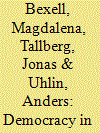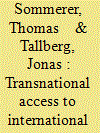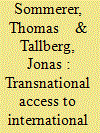|
|
|
Sort Order |
|
|
|
Items / Page
|
|
|
|
|
|
|
| Srl | Item |
| 1 |
ID:
178727


|
|
|
|
|
| Summary/Abstract |
While a dominant position in research on compliance holds that enforcement is necessary for states to abide by their international commitments, many international organizations (IOs) do not have recourse to such coercive means. This article offers the first systematic analysis of one prominent alternative to material coercion: compliance reporting by IOs. It develops an argument for why reporting by IOs should lead states to correct non-compliant behavior, and when those effects should be particularly strong. It tests this argument in the context of the International Labour Organization (ILO), which offers a unique setting for evaluating the impact of reporting in the absence of coercion. The principal findings are threefold. First, reporting has significant and durable effects on state respect for labor rights. Second, reporting affects compliance both immediately and when repeated over longer periods of time. Third, reporting has stronger effects on improvements in labor rights when target states are democratic and resourceful, and have a stronger presence of labor NGOs. By contrast, it does not matter to reporting’s effect whether states are highly economically dependent on the outside world or whether reporting is coupled with active shaming of non-compliant states. Taken together, our results suggest that existing research has not fully appreciated the potential of monitoring systems based on reporting to generate compliance with international rules. While hard enforcement may still be important, especially in areas where incentives to renege are strong, the findings of this article suggest that it is not the exclusive path to compliance.
|
|
|
|
|
|
|
|
|
|
|
|
|
|
|
|
| 2 |
ID:
094485


|
|
|
|
|
| Publication |
2010.
|
| Summary/Abstract |
The participation of transnational actors in global policymaking is increasingly seen as a means to democratize global governance. Drawing on alternative theories of democracy and existing empirical evidence, we assess the promises and pitfalls of this vision. We explore how the structuring and operation of international institutions, public-private partnerships, and transnational actors themselves may facilitate expanded participation and enhanced accountability in global governance. We find considerable support for an optimistic verdict on the democratizing potential of transnational actor involvement, but also identify hurdles in democratic theory and the practice of global governance that motivate a more cautious outlook. In conclusion, we call for research that explores the conditions for democracy in global governance through a combination of normative political theory and positive empirical research.
|
|
|
|
|
|
|
|
|
|
|
|
|
|
|
|
| 3 |
ID:
165169


|
|
|
|
|
| Summary/Abstract |
While extensive research shows that policies and institutions spread across states through processes of diffusion, we know little about diffusion among international organizations (IOs). We develop a novel approach for the study of diffusion among IOs. This approach consists of three components: a theoretical focus on connectivity among IOs as pathways for diffusion; a conceptual differentiation between alternative types of convergence effects; and a methodological strategy combining dyadic and spatial analysis of diffusion. We illustrate the usefulness of this approach through an empirical case: the diffusion of participatory governance arrangements among IOs from 1970 to 2010. The analysis shows that connectivity among IOs contributes to convergence, which typically is manifested through imitation of very specific institutional models. The article's findings have implications both for the study of IOs and for the general study of diffusion.
|
|
|
|
|
|
|
|
|
|
|
|
|
|
|
|
| 4 |
ID:
134976


|
|
|
|
|
| Summary/Abstract |
Past decades have witnessed a shift in international cooperation toward growing involvement of transnational actors (TNAs), such as nongovernmental organizations, multinational corporations, and philanthropic foundations. This article offers a comprehensive theoretical and empirical account of TNA access to IOs. The analysis builds on a novel data set, covering formal TNA access to 298 organizational bodies from fifty IOs over the time period 1950 to 2010. We identify the most profound patterns in TNA access across time, issue areas, policy functions, and world regions, and statistically test competing explanations of the variation in TNA access. The central results are three-fold. First, the empirical data confirm the existence of a far-reaching institutional transformation of IOs over the past sixty years, pervading all issue areas, policy functions, and world regions. Second, variation in TNA access within and across IOs is mainly explained by a combination of three factors: functional demand for the resources of TNAs, domestic democratic standards in the membership of IOs, and state concerns with national sovereignty. Third, existing research suffers from a selection bias that has led it to overestimate the general importance of a new participatory norm in global governance for the openness of IOs.
|
|
|
|
|
|
|
|
|
|
|
|
|
|
|
|
| 5 |
ID:
095385


|
|
|
|
|
| Publication |
2010.
|
| Summary/Abstract |
This article addresses the influence wielded by the formal leaders of international cooperation-those state or supranational representatives that chair and direct negotiations in the major decision bodies of multilateral organizations and conferences. This is a topic that so far has received limited systematic attention by IR theorists, who have tended to treat bargaining parties as functionally and formally equivalent, leaving little theoretical space for formal leadership. Drawing on rational choice institutionalism, I introduce a theory that develops a coherent argument for the delegation of authority to the chairmanship, the power resources of negotiation chairs, and the influence of formal leaders over outcomes. I assess the explanatory power of this theory through evidence on formal leadership in three alternative organizational settings: the European Union, the General Agreement on Tariffs and Trade/the World Trade Organization, and the United Nations environmental conferences. I find in favor of the chairmanship as a source of independent influence in international cooperation. Formal leaders perform functions of agenda management, brokerage, and representation that make it more likely for negotiations to succeed, and possess privileged resources that may enable them to steer negotiations toward the agreements they most prefer.
|
|
|
|
|
|
|
|
|
|
|
|
|
|
|
|
| 6 |
ID:
139586


|
|
|
|
|
| Summary/Abstract |
Social legitimacy is central to the effectiveness of international organisations (IOs). Yet, so far, we have little systematic knowledge about what drives citizens to support or oppose IOs. In this article, we isolate and assess three alternative explanations of social legitimacy in global governance, privileging interest representation, institutional performance, and confidence extrapolation. We test these theories in a multilevel analysis of citizen confidence in the United Nations (UN) using World Values Survey and European Values Study data, supplemented by contextual measures. The results grant support to the arguments that institutional performance and confidence extrapolation shape popular confidence in the UN, while offering little support for the explanation of interest representation. These findings challenge the predominant understanding that more democratic procedures lead to greater social legitimacy for IOs. Instead, the UN case suggests that the social legitimacy of IOs is based primarily on the organisations' capacity to deliver, as well as on citizens' general confidence in political institutions, which IOs may have little to do with and can do little to change.
|
|
|
|
|
|
|
|
|
|
|
|
|
|
|
|
| 7 |
ID:
154917


|
|
|
|
|
| Summary/Abstract |
This article introduces a new data set on the access of transnational actors (TNAs) to international organizations (IOs). While IOs were long the exclusive preserve of member governments, recent decades have witnessed a shift toward more inclusive forms of governance, involving participation by non-governmental organizations, philanthropic foundations, multinational corporations, and other forms of TNAs. Yet existing research has lacked the data necessary to map this phenomenon and its variation over dimensions such as time, issue areas, and world regions. The TRANSACCESS data set is designed for this purpose and contains information on the level of openness in 298 bodies of 50 IOs from 1950 to 2010. On the basis of this data set, we also introduce a first quantitative measure of institutional openness in the shape of a composite index, available at both the IO and body levels. This index can be used to compare TNA access across and within IOs but also as a variable in large-N studies on global and regional governance, where IO openness is potentially relevant.
|
|
|
|
|
|
|
|
|
|
|
|
|
|
|
|
| 8 |
ID:
156223


|
|
|
|
|
| Summary/Abstract |
This article introduces a new data set on the access of transnational actors (TNAs) to international organizations (IOs). While IOs were long the exclusive preserve of member governments, recent decades have witnessed a shift toward more inclusive forms of governance, involving participation by non-governmental organizations, philanthropic foundations, multinational corporations, and other forms of TNAs. Yet existing research has lacked the data necessary to map this phenomenon and its variation over dimensions such as time, issue areas, and world regions. The TRANSACCESS data set is designed for this purpose and contains information on the level of openness in 298 bodies of 50 IOs from 1950 to 2010. On the basis of this data set, we also introduce a first quantitative measure of institutional openness in the shape of a composite index, available at both the IO and body levels. This index can be used to compare TNA access across and within IOs but also as a variable in large-N studies on global and regional governance, where IO openness is potentially relevant.
|
|
|
|
|
|
|
|
|
|
|
|
|
|
|
|
|
|
|
|
|